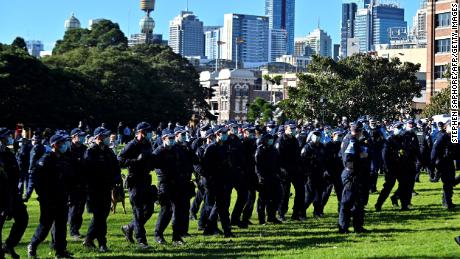Australia once reveled in being the ‘lucky country’ on Covid-19. Not anymore

“My darling,” it says. “How are you? Are you enjoying school? Do you have friends? Your brother is one year old now. I hope you can come and see me in Australia one day. I love you and think of you often — from ‘Nana in Australia.'” “Nana in Australia” is the pixelated face on my laptop, the voice cutting out on my phone. She lives on the other side of the world, in a place where Covid-19 doesn’t exist, or at least not to the degree that it has ravaged the United Kingdom with a terrifying ferocity. For much of 2020, Australia’s success in controlling the virus was the envy of the world. By March of that year, as Italian hospitals drowned in cases and the UK dithered about restrictions, Australia decisively closed its borders — and the tactic initially paid off. A country of 25 million people, it has recorded just over 900 coronavirus-related deaths since the pandemic began. Its total case numbers are around 32,000 — a figure the UK is exceeding daily. And its economy has bounced back. But more than a year on, Australians remain shut inside their gilded cage, relying on a series of short, sharp lockdowns to quell an outbreak of the highly-contagious Delta variant. Angela O’Connell, a 39-year-old teacher from Australia, moved to Singapore six years ago along with her Australian husband and two children. Their work contracts end later this year, and the family is now expecting to pay up to 12,000 Australian dollars ($8,800) for airfares and quarantine fees to return home. “Never in my mind would I ever think that there would be a possibility that your own country would shut the borders on you,” she said, the sound of traffic on Singapore’s Orchard Road roaring in the background. “When I think of past disasters, it’s always been: ‘Get our people home.’ This one seems to be very different.” Before the pandemic, being an expat was always viewed as a “very positive thing,” said O’Connell. “I think we’re bringing back great skills from where we’ve come from, and a different world view.” But with Covid-19, she said the mood had changed. “Suddenly it was like, ‘oh no, they shouldn’t have gone over there.'” Georgina Scholes, a 39-year-old Australian living in Denmark with her Danish husband and two children, always thought she would return home at some point, “because I want my kids to grow up a little bit Australian.” Those plans have now been put on hold indefinitely; her Australian family is yet to meet her five-month-old son. Scholes initially supported Australia’s coronavirus elimination strategy. But she now casts doubt over whether such a policy is achievable anywhere in the world — particularly in Europe, she said, where “it’s not as possible to just lock the borders and keep people out.” Speaking to fellow Australians locked both in and out of the country, the question that comes up time and time again is: How long can this go on for? Meanwhile, back home, “Nana in Australia” waits for her second jab, waits for a 4-year-old’s postcard and waits to cuddle a 1-year-old grandson she’s never met.


